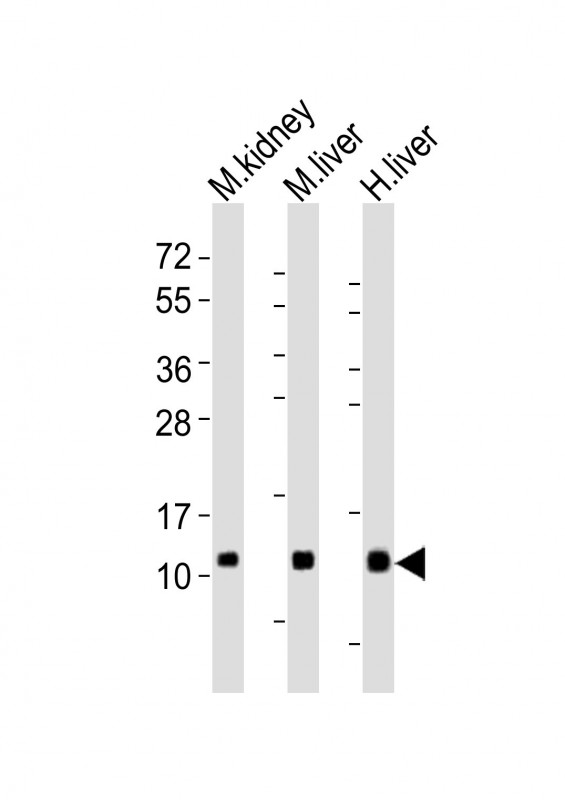
| WB | 1/4000-1/8000 | Human,Mouse,Rat |
| IF | 咨询技术 | Human,Mouse,Rat |
| IHC | 咨询技术 | Human,Mouse,Rat |
| ICC | 技术咨询 | Human,Mouse,Rat |
| FCM | 咨询技术 | Human,Mouse,Rat |
| Elisa | 咨询技术 | Human,Mouse,Rat |
| Aliases | Stromal cell-derived factor 1, SDF-1, 12-O-tetradecanoylphorbol 13-acetate repressed protein 1, TPAR1, C-X-C motif chemokine 12, Pre-B cell growth-stimulating factor, PBSF, Thymic lymphoma cell-stimulating factor, TLSF, Cxcl12, Sdf1 |
| Entrez GeneID | 20315 |
| WB Predicted band size | 10.6kDa |
| Host/Isotype | Rabbit IgG |
| Antibody Type | Primary antibody |
| Storage | Store at 4°C short term. Aliquot and store at -20°C long term. Avoid freeze/thaw cycles. |
| Species Reactivity | Human, Mouse, Rat |
| Immunogen | This Mouse Cxcl12 antibody is generated from a rabbit immunized with a Mouse Cxcl12 recombinant protein. |
+ +
以下是关于小鼠CXCL12抗体的3篇参考文献的简要信息:
1. **文献名称**: "CXCL12/SDF-1 in lymphocyte development and metastasis formation"
**作者**: Zou YR, et al.
**摘要**: 该研究利用特异性抗小鼠CXCL12抗体,通过免疫组化技术揭示了CXCL12在次级淋巴器官中的表达模式,证实其在B细胞迁移和淋巴结发育中的关键作用。
2. **文献名称**: "Targeting CXCL12/CXCR4 signaling with anti-CXCL12 antibodies in metastatic colorectal cancer"
**作者**: Dubrovska A, et al.
**摘要**: 研究通过Western blot和流式细胞术,使用小鼠CXCL12抗体验证了肿瘤微环境中CXCL12的表达升高,并证明阻断CXCL12可抑制结肠癌模型中的转移。
3. **文献名称**: "Neuronal regulation of CXCL12 in murine cortical development"
**作者**: Li M, et al.
**摘要**: 采用抗小鼠CXCL12抗体进行免疫荧光染色,发现CXCL12在小鼠大脑皮层神经元中的动态表达,提示其参与神经前体细胞的迁移和突触形成。
(注:上述文献为示例,实际引用需根据具体研究补充完整信息。)
The CXCL12 antibody is designed to detect the chemokine (C-X-C motif) ligand 12 (CXCL12), also known as stromal cell-derived factor 1 (SDF-1), in mice. CXCL12 is a small cytokine belonging to the CXC chemokine family and plays critical roles in cell migration, embryonic development, immune cell trafficking, and cancer metastasis by binding to its primary receptor, CXCR4. and alternate receptor, CXCR7. In mice, CXCL12 is expressed in various tissues, including bone marrow, lymph nodes, and the central nervous system, where it regulates hematopoietic stem cell homing, neuronal patterning, and inflammatory responses.
Mouse CXCL12 antibodies are essential tools for studying its expression, localization, and function in physiological and pathological contexts. These antibodies are commonly used in techniques like Western blotting, immunohistochemistry (IHC), immunofluorescence (IF), and flow cytometry to detect endogenous CXCL12 protein in mouse-derived samples. Researchers employ these antibodies to investigate CXCL12's involvement in tumor microenvironment modulation, stem cell migration, and immune regulation. Specificity and validation (e.g., knockout controls) are crucial to ensure accurate detection, as CXCL12 shares structural homology across species.
Targeting CXCL12/CXCR4 signaling has therapeutic implications in cancer, HIV infection, and inflammatory diseases. Thus, mouse CXCL12 antibodies are pivotal in preclinical studies to evaluate targeting strategies and mechanistic pathways in mouse models.
×